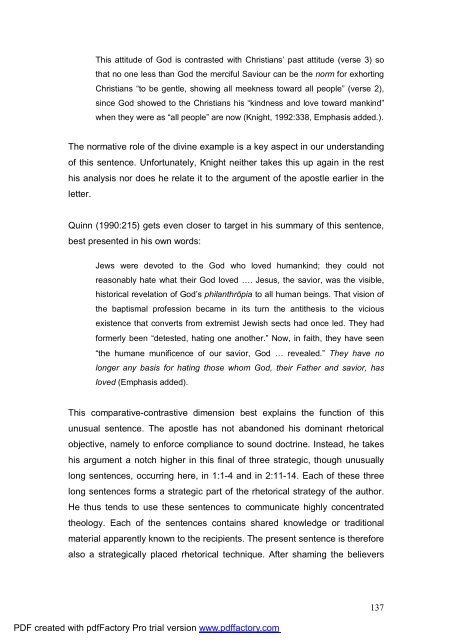A Text centred rhetorical analysis of Paul's Letter to Titus
A Text centred rhetorical analysis of Paul's Letter to Titus
A Text centred rhetorical analysis of Paul's Letter to Titus
Create successful ePaper yourself
Turn your PDF publications into a flip-book with our unique Google optimized e-Paper software.
This attitude <strong>of</strong> God is contrasted with Christians’ past attitude (verse 3) so<br />
that no one less than God the merciful Saviour can be the norm for exhorting<br />
Christians “<strong>to</strong> be gentle, showing all meekness <strong>to</strong>ward all people” (verse 2),<br />
since God showed <strong>to</strong> the Christians his “kindness and love <strong>to</strong>ward mankind”<br />
when they were as “all people” are now (Knight, 1992:338, Emphasis added.).<br />
The normative role <strong>of</strong> the divine example is a key aspect in our understanding<br />
<strong>of</strong> this sentence. Unfortunately, Knight neither takes this up again in the rest<br />
his <strong>analysis</strong> nor does he relate it <strong>to</strong> the argument <strong>of</strong> the apostle earlier in the<br />
letter.<br />
Quinn (1990:215) gets even closer <strong>to</strong> target in his summary <strong>of</strong> this sentence,<br />
best presented in his own words:<br />
Jews were devoted <strong>to</strong> the God who loved humankind; they could not<br />
reasonably hate what their God loved …. Jesus, the savior, was the visible,<br />
his<strong>to</strong>rical revelation <strong>of</strong> God’s philanthrōpia <strong>to</strong> all human beings. That vision <strong>of</strong><br />
the baptismal pr<strong>of</strong>ession became in its turn the antithesis <strong>to</strong> the vicious<br />
existence that converts from extremist Jewish sects had once led. They had<br />
formerly been “detested, hating one another.” Now, in faith, they have seen<br />
“the humane munificence <strong>of</strong> our savior, God … revealed.” They have no<br />
longer any basis for hating those whom God, their Father and savior, has<br />
loved (Emphasis added).<br />
This comparative-contrastive dimension best explains the function <strong>of</strong> this<br />
unusual sentence. The apostle has not abandoned his dominant <strong>rhe<strong>to</strong>rical</strong><br />
objective, namely <strong>to</strong> enforce compliance <strong>to</strong> sound doctrine. Instead, he takes<br />
his argument a notch higher in this final <strong>of</strong> three strategic, though unusually<br />
long sentences, occurring here, in 1:1-4 and in 2:11-14. Each <strong>of</strong> these three<br />
long sentences forms a strategic part <strong>of</strong> the <strong>rhe<strong>to</strong>rical</strong> strategy <strong>of</strong> the author.<br />
He thus tends <strong>to</strong> use these sentences <strong>to</strong> communicate highly concentrated<br />
theology. Each <strong>of</strong> the sentences contains shared knowledge or traditional<br />
material apparently known <strong>to</strong> the recipients. The present sentence is therefore<br />
also a strategically placed <strong>rhe<strong>to</strong>rical</strong> technique. After shaming the believers<br />
PDF created with pdfFac<strong>to</strong>ry Pro trial version www.pdffac<strong>to</strong>ry.com<br />
137

















